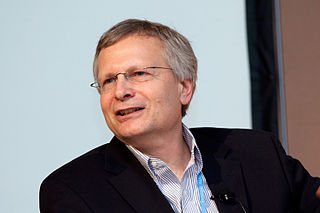A Quote by Tariq Ramadan
Destroying the nation state are mainly three things: the global economy, global communication technology and global culture. And this is where we are lost in the process. What could be something that can provide us a transversal political sense of belonging? At the end of the day, without an alternative we end up with populism in the name of very narrow identities.
Quote Topics
Alternative
Belonging
Communication
Communication Technology
Could
Culture
Day
Destroying
Economy
End
End Of The Day
Global
Global Economy
Identities
Lost
Mainly
Name
Narrow
Nation
Political
Populism
Process
Provide
Sense
Something
State
Technology
The End Of The Day
Things
Three
Three Things
Up
Us
Very
Without
Related Quotes
Unlike national markets, which tend to be supported by domestic regulatory and political institutions, global markets are only 'weakly embedded'. There is no global lender of last resort, no global safety net, and of course, no global democracy. In other words, global markets suffer from weak governance, and are therefore prone to instability, inefficiency, and weak popular legitimacy.
The United States is strongly committed to the IPCC process of international cooperation on global climate change. We consider it vital that the community of nations be drawn together in an orderly, disciplined, rational way to review the history of our global environment, to assess the potential for future climate change, and to develop effective programs. The state of the science, the social and economic impacts, and the appropriate strategies all are crucial components to a global resolution. The stakes here are very high; the consequences, very significant.
Oil is a tangible commodity, so there is a global market. The fact that we may need less may affect the global price because we're big consumers: we probably take about a quarter of global demand. But if suddenly, let's just use a crazy example, fighting in the Middle East led to the closure of the Strait of Hormuz and no oil could get out through the Strait of Hormuz, well that would affect China, India, Europe, it will affect the whole global economy. It will affect us, too, then.
The point I'm trying to make is if these networks of communication technologies are owned, monetized, surveilled, and classified by those with power - very few people, mainly white men in Silicon Valley - then it is a global village build upon the ideas, visions, words, and protocols of the few. So it's not global - it's like Epcot center. It's like Disneyland: a small worldview of the larger world.
Economics now drives politics. This gives us a system in which the relationship between power and politics is no longer fused. Power is global. We have an elite that now floats in global flows. It could care less about the nation-state, and it could care less about traditional forms of politics. Hence, it makes no political concessions whatsoever. It attacks unions, it attacks public schools, it attacks public goods. It doesn't believe in the social contract.
There is the global teenager hypothesis, that what happened in the '60s in America was that there was, the baby boom cohort grew up at the same time that television and popular music grew up, so that we had this carrier frequency that we all tuned into that gave us the feeling of a common culture, even though I was in Phoenix and someone was in Des Moines. That now we are getting the global cohort at the same time we have our first global communications. MTV is everywhere.






































